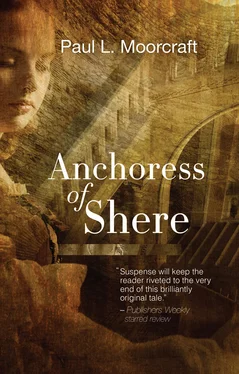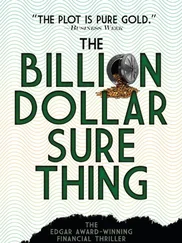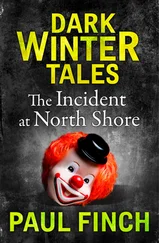Paul Moorcraft - The Anchoress of Shere
Здесь есть возможность читать онлайн «Paul Moorcraft - The Anchoress of Shere» весь текст электронной книги совершенно бесплатно (целиком полную версию без сокращений). В некоторых случаях можно слушать аудио, скачать через торрент в формате fb2 и присутствует краткое содержание. Жанр: Триллер, на английском языке. Описание произведения, (предисловие) а так же отзывы посетителей доступны на портале библиотеки ЛибКат.
- Название:The Anchoress of Shere
- Автор:
- Жанр:
- Год:неизвестен
- ISBN:нет данных
- Рейтинг книги:4 / 5. Голосов: 1
-
Избранное:Добавить в избранное
- Отзывы:
-
Ваша оценка:
- 80
- 1
- 2
- 3
- 4
- 5
The Anchoress of Shere: краткое содержание, описание и аннотация
Предлагаем к чтению аннотацию, описание, краткое содержание или предисловие (зависит от того, что написал сам автор книги «The Anchoress of Shere»). Если вы не нашли необходимую информацию о книге — напишите в комментариях, мы постараемся отыскать её.
The Anchoress of Shere — читать онлайн бесплатно полную книгу (весь текст) целиком
Ниже представлен текст книги, разбитый по страницам. Система сохранения места последней прочитанной страницы, позволяет с удобством читать онлайн бесплатно книгу «The Anchoress of Shere», без необходимости каждый раз заново искать на чём Вы остановились. Поставьте закладку, и сможете в любой момент перейти на страницу, на которой закончили чтение.
Интервал:
Закладка:
Keeping to the shadows, he walked along the stream side of the square. He glanced over his shoulder and saw two police cars, a hundred and fifty yards away, parked between the stone bridge and Marda’s flat. No one would expect him to be in the centre of Shere; that was the last place anyone would be looking, but he still had to move fast.
In the pitch darkness, he managed somehow to drag the heavy crucifix from the car to the side porch of the church. The door was never locked; even with the rise in crime, a village church was nearly always safe from vandals or thieves. Exhausted and soaked in sweat, he sat down on the pew nearest to the medieval site of Christine Carpenter’s cell. He looked with sadness on the sacred quatrefoil and squint, the last time he would gaze upon these relics of her life. These relics of his life, too.
He lit a candle and placed it at the base of the quatrefoil on the floor of the church. Alongside he placed his typescript, his offering to the holy Christine. Perhaps now, in his infamy, people would recognise his book, his lengthy intellectual toil.
Christine had prayed so long, so hard, for Jesus Christ to answer her; to provide a sign, to make the crucifix weep those tears of absolution. Now tears would weep for her. The agony of crucifixion would be displayed before her eyes.
The crucifix lay flat, shadowed by the flickering candle. One arm of the crucifix still had a nail protruding from where it had been fixed in the cellar. He hammered six-inch nails into the other spar and into the small spar on the base. Duval had practised a crucifixion recently. He had failed then, but nobody would stop him now.
Once the nails were in place, he carried the cross to the edge of the chancel, a short distance from the place where Christine had sought absolution. He propped the cross at a forty-five-degree angle to the wall. Using the thick cross-spar at the base as a step, he stretched his arms along the span of the cross and gazed longingly at the two squints, the windows of Christine’s cell, the lights of her tiny universe. His book stood reverentially at the base of her anchorhold, flickering in the candlelight of remembrance. Tears would fall from the crucifix before her very eyes.
Duval felt the salt taste on the edge of his mouth. Balanced precariously on the cross-spar at the base of the cross, he removed his jacket, shirt and trousers. He was too engrossed in his spiritual dedication to feel the cold, but it would take a supreme act of will to force his wrists and feet through the beckoning nails.
The powerful presence of the saintly anchoress would be appeased by the blood of crucifixion, the ultimate act of worship. But Duval asked himself whether he was strong enough, let alone holy enough, to imitate his Saviour.
Despite the lateness of the hour, Marda’s parents had made her flat warm and inviting. And, despite the presence of the police guard and the lanky American, Marda was smothered with family affection, and the dog was curled up in front of an electric heater. It was a time of joy and concern: a daughter returned, a son recovering in intensive care. Marda’s father and the professor demolished most of a bottle of Scotch, while the two women and the police officer consumed endless cups of tea.
Marda tried to explain her feelings, the complete desperation she had felt while in her prison, her total anguish at the manner of her brother’s treatment by Duval, the lengths to which Mark had gone to save her.
“But I also feel so strong,” she said. “I survived the ordeal and I’m alive! Perhaps God, after all, answered my prayers…”
She stopped, surprised to realise how important these prayers had been to her sanity. She wondered, too, if she could continue to be strong, to survive the coming weeks, especially, God forbid, if Mark did not pull through.
Her mother seemed to read her thoughts. “It might be hard, coming to grips with life again. A new life, for it will never be the same,” she said, putting both her arms around the emaciated girl. Her very last reserves of strength utterly depleted, Marda fell soundly asleep on her mother’s shoulder.
The knock on the flat door came at eight o’clock in the morning, when it was still almost dark outside. The policeman opened the door and was met by his breathless superintendent, who enhanced the drama of his message by trying to underplay it: “We’ve found him,” he said, trying to control his excitement. “In the church. We’ve called off the alert.”
“So you trapped him there?” Gould asked.
Superintendent Woodward led Gould outside to answer him, because he thought the details might upset the already distressed Stewart family. “No, he was already dead. Crucified, it appears.”
Gould looked at the policeman in amazement.
“This is just preliminary, you understand. One of my men saw a police car at the rear of the church and went in. I’ve just taken the message on the car radio. One of my men is missing, too. I’m going straight to the church now, but I wanted to tell the Stewarts first.”
“May I come with you, Superintendent?” asked the professor.
The policeman nodded, and the two men hastened to the nearby church.
Gould had seen thousands of depictions of crucifixions, but nothing could have prepared him for the reality: the head was slumped on the chest and dried, matted smudges of blood and strands of tissue disfigured the body, especially around the wrists and feet.
The three policemen and the academic just stared.
Gould was the first to ask: “Why is his face so smashed up?”
He waited a long moment before adding, “Are you sure it’s Duval? You said one of your men was missing. It must be damned difficult to crucify yourself.”
The policemen looked at him in horror. They did not want to believe it could be one of their own.
Shere’s doctor had had a busy night. Arriving a few minutes after Gould, he cleaned up the face a little and suggested that it was the body of a man in his late fifties or early sixties. Too old, probably, for Duval, but even the sergeant at McGregor’s own station was not sure.
“I’m sorry, Super,” he said, his voice strained. “I’ve never seen old McGregor with no clothes on, and the face is unrecognisable. There are no rings an’ all, but he’s missing and it could be him.”
The body was not positively identified until two hours later. The official alert was renewed, and the sweep of the woods was begun. It had given Duval, however, that extra margin of time. He had used it well: at that very moment, Father Duval was contentedly smoking his pipe on board a small fishing boat en route to Ireland.
The professor walked back to Marda’s flat, alongside the Tillingbourne. The weeping willows, bent in anguish, matched his mood. He did not want to inflict more pain on the Stewarts, so he explained that the police would bring further news shortly.
When, a few minutes later, the superintendent told the assembled Stewart family that the dead man was a policeman who had been guarding Duval’s house, Marda and the professor stared at each other. There was a profound intensity and understanding in that look.
“Why did he go back to the house?” Marda’s father asked.
“It’s amazing how many murderers are drawn back to the scene of their crimes, even when it’s highly dangerous to return,” the superintendent said confidently.
“No, Superintendent.” Marda’s voice sounded suddenly very tired. “He was looking for a book, one he has worked on for years.”
Marda said no more. She knew intuitively that Duval had found his book. A glance at Gould told him not to say anything, not to alarm her parents any more than was necessary; the news that Duval was still loose on a murderous spree was more than enough. Marda wondered whether her long isolation had honed some sixth sense.
Читать дальшеИнтервал:
Закладка:
Похожие книги на «The Anchoress of Shere»
Представляем Вашему вниманию похожие книги на «The Anchoress of Shere» списком для выбора. Мы отобрали схожую по названию и смыслу литературу в надежде предоставить читателям больше вариантов отыскать новые, интересные, ещё непрочитанные произведения.
Обсуждение, отзывы о книге «The Anchoress of Shere» и просто собственные мнения читателей. Оставьте ваши комментарии, напишите, что Вы думаете о произведении, его смысле или главных героях. Укажите что конкретно понравилось, а что нет, и почему Вы так считаете.












